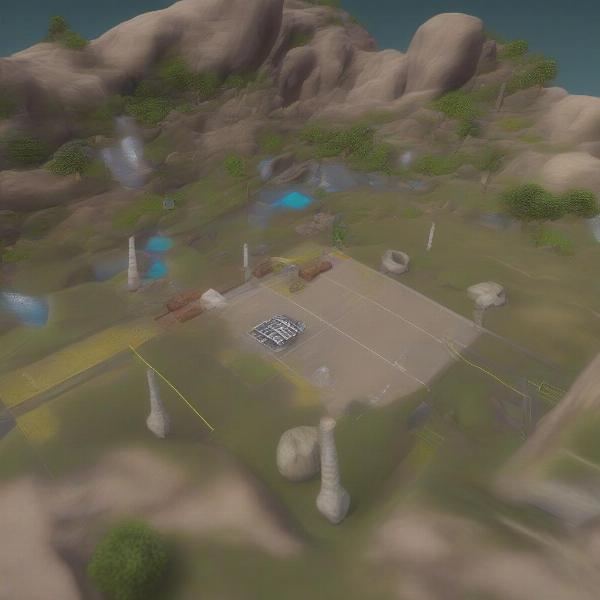Game design is a multifaceted field, blending creativity with technical prowess. Aspiring game designers often wonder what skills are necessary to thrive in this competitive industry. This article dives deep into the essential skills needed to be a game designer, providing a comprehensive roadmap for those looking to break into this exciting career.
Similar to how to get into video game development, understanding the required skills is crucial for success. The path to becoming a successful game designer isn’t solely paved with artistic talent; it demands a blend of technical understanding, analytical thinking, and strong communication.
Core Skills for Game Design
Several core skills form the foundation of a successful game designer’s toolkit. These abilities are not just desirable; they’re essential for translating a game’s vision into a playable reality.
Programming and Technical Proficiency
While not always mandatory, a basic understanding of programming languages like C++, C#, or Python can be incredibly advantageous. This knowledge allows designers to better understand the technical limitations and possibilities, enabling more effective collaboration with programmers and a smoother development process. It also empowers designers to prototype their ideas and mechanics quickly.
Design Principles and Game Mechanics
A strong grasp of design principles is paramount. This includes understanding game mechanics, level design, balancing gameplay, and creating compelling user experiences. Aspiring designers should familiarize themselves with classic game designs, analyzing what makes them successful and applying those lessons to their work.
Creative Thinking and Problem-Solving
Game design is essentially a problem-solving exercise. Designers constantly face challenges, from balancing game difficulty to designing engaging narratives. Creative thinking, brainstorming, and the ability to think outside the box are essential for overcoming these hurdles and delivering innovative gameplay experiences.
 Game Design Brainstorming Session
Game Design Brainstorming Session
Storytelling and Narrative Design
Many games rely heavily on compelling narratives to engage players. Even in gameplay-focused titles, a well-crafted story can significantly enhance the experience. Therefore, understanding narrative structure, character development, and world-building can be highly valuable for aspiring game designers.
Communication and Collaboration
Game development is a team effort. Designers need to communicate their ideas effectively to programmers, artists, and other team members. This requires strong written and verbal communication skills, as well as the ability to collaborate and work constructively within a group. Knowing how to give and receive feedback is crucial.
Specialized Skills for Game Design
Beyond the core skills, certain specialized skills can give aspiring game designers a competitive edge.
User Interface (UI) and User Experience (UX) Design
A well-designed UI/UX is vital for a positive player experience. Understanding how to create intuitive and visually appealing interfaces can significantly impact a game’s success. This involves considering factors like accessibility, information architecture, and user flow.
Level Design and World-Building
Creating immersive and engaging game worlds is a specialized skill within game design. This requires understanding spatial reasoning, environment design, and how to guide players through the game world effectively.
 Level Design Software Interface
Level Design Software Interface
Game Balancing and Playtesting
Balancing gameplay mechanics and ensuring a fair and enjoyable challenge for players requires analytical thinking and attention to detail. Playtesting and gathering feedback are crucial for identifying and addressing balance issues.
Monetization and Game Economy
In many games, particularly mobile and free-to-play titles, understanding monetization strategies and designing in-game economies is essential. This involves balancing player enjoyment with revenue generation.
How to Develop Your Game Design Skills
So, how do you acquire these essential skills? There are several paths you can take.
Formal Education
Many universities and colleges offer game design programs that provide a structured learning environment and cover a wide range of relevant skills. This can be a valuable investment, particularly for those seeking a comprehensive education in the field. If you’re wondering how to learn game design, formal education is a great starting point.
Online Courses and Tutorials
Numerous online resources offer specialized training in specific game design areas, from programming to level design. These can be a more accessible and affordable option for those looking to supplement their skills or learn at their own pace.
Personal Projects and Portfolio Development
Building a portfolio of personal projects is arguably the most critical aspect of becoming a game designer. This allows you to apply your knowledge, experiment with different game mechanics, and demonstrate your abilities to potential employers. Don’t be afraid to start small and iterate on your ideas.
You can learn more about starting your game design journey by reading our article on how to learn game design. It provides a comprehensive guide to help you get started.
 Game Designer Working on a Personal Project
Game Designer Working on a Personal Project
The Future of Game Design
The game design landscape is constantly evolving with new technologies and trends. Staying current with these advancements is crucial for staying competitive in this dynamic industry.
Virtual Reality (VR) and Augmented Reality (AR)
VR and AR are transforming the way we experience games, opening up exciting new possibilities for immersive and interactive gameplay. Game designers who can adapt to these technologies and leverage their unique capabilities will be at the forefront of innovation.
Artificial Intelligence (AI) and Machine Learning (ML)
AI and ML are playing an increasingly important role in game development, from creating more realistic enemy behavior to personalizing player experiences. Understanding these technologies can give designers a significant advantage.
Cloud Gaming and Streaming Services
Cloud gaming is removing the barriers to entry for players, making games more accessible than ever before. This presents new opportunities for designers to reach wider audiences and create innovative gameplay experiences.
Conclusion
Becoming a successful game designer requires a diverse skill set and a passion for creating engaging interactive experiences. By focusing on developing the core and specialized skills outlined in this article, aspiring designers can equip themselves for a rewarding career in this exciting and ever-evolving industry. Remember, building a strong portfolio and staying current with industry trends are crucial for success. So, start learning, start creating, and embark on your journey to becoming a game designer! What Skills Are Needed To Be A Game Designer? We hope this article has provided you with the answer.
FAQ
- Do I need a degree to be a game designer? While a degree can be helpful, it’s not strictly required. A strong portfolio and demonstrable skills are often more important.
- What’s the best programming language to learn for game design? C++, C#, and Python are all popular choices, and the best one for you will depend on your specific interests and the type of games you want to create.
- How can I build a game design portfolio? Start with small personal projects and gradually increase the complexity as your skills develop. Don’t be afraid to experiment and showcase your creativity.
- Is it difficult to get a job in game design? The industry is competitive, but with hard work, dedication, and a strong portfolio, you can increase your chances of success. Check out how to get into video game development for more insights.
- What are some common mistakes aspiring game designers make? Focusing too much on graphics over gameplay, neglecting playtesting, and not communicating effectively with the team are common pitfalls to avoid.
- What are the career paths in game design? You can specialize in areas like level design, narrative design, systems design, or even become a lead designer. If climbing the career ladder interests you, you might want to explore a difficult game about climbing walkthrough for a unique perspective.
- How can I stay up-to-date with the latest game design trends? Attend industry events, read game development blogs, and engage with online communities to stay informed. You could also explore how to play concentrate scary game to understand the latest trends in horror game design.

